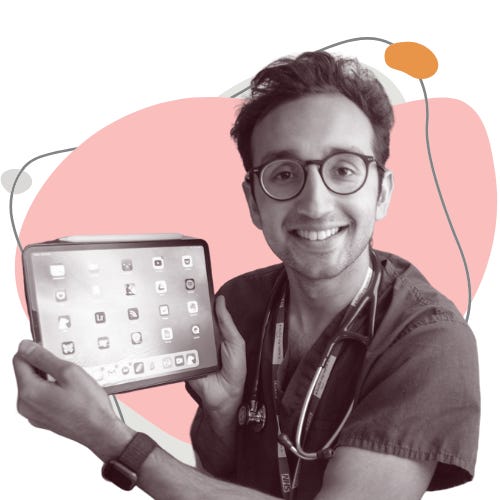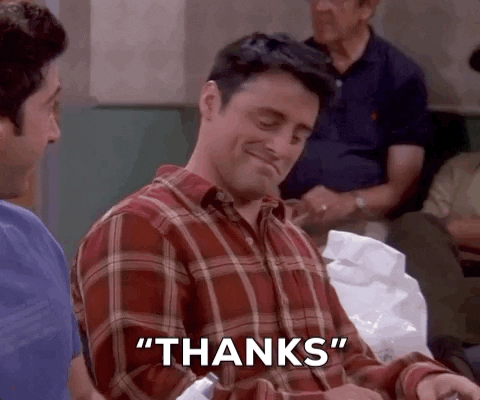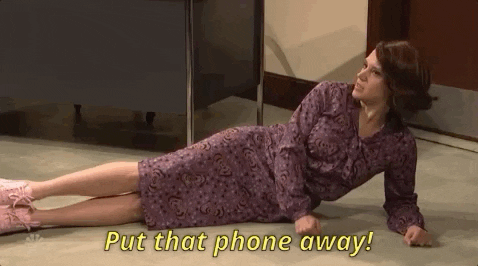👨💻 The Most Productive Person on the Internet: An Interview with Ali Abdaal
I interviewed Ali Abdaal, a UK doctor, Podcaster, and YouTuber with over 1 million subscribers, about what’s on his home screen (12 min read)
Homescreens is a publication about how we interact with our most intimate possession, our phones. Each week I interview founders and creators across industries and we reflect on the apps they use, how they’re organized, and their philosophy on notifications and mindfulness.

For many people, graduating from Cambridge University and becoming a doctor would be a peak achievement. A time to settle down, maybe learn the piano and pick-up a hobby or two—but that’s not in Ali Abdaal’s makeup.
You see, Ali has had an entrepreneurial mindset his entire life. At age 12 he taught himself how to code, something he has stated many times is the piece of advice for anyone interested in starting their own business. Throughout his youth, he freelanced as a web designer earning extra income, setting the foundation for his future ventures.
As a student at Cambridge, he founded 6med, a company that helps students applying to medical school by providing crash courses and full online courses—merging two of Ali’s passions: helping others learn and utilizing technology. Although he has since stepped back into an advisory role, this business averages $160,000 in annual revenue—not a bad college side hustle.
Today, Ali spends much of his time when he’s not off doctoring, working on his YouTube channel that recently crossed the 1 million subscriber milestone. Here he speaks on topics of productivity, technology, and lifestyle. Ali has built a reputation for being transparent, informative, and a quick talker—the latter is often joked about in his comment sections (comically, you’ll find Ali embrace the more disparaging remarks via screenshots in his Instagram stories).
Let’s get to know Ali a little more, and see what’s on his phone. What follows is our interview, edited for length and clarity.
Jason: Ali, thanks for participating. You’ve been an entrepreneur for the majority of your life. You’re a doctor, YouTuber, podcaster—I’d love it if you could give us a backstory of those aspects of your life.
Ali: Yeah, sure. I'm a doctor. I'm 26 years old. I've been a doctor for two years now, and that's my main gig. But then I've really been into this whole side hustle vibe ever since I read The 4-Hour Work Week when I was 18 years old. And so, when I was in med school I set up a business [6med], and it did quite well. Later on, I set up a YouTube channel in my final year of med school, and that's been going on for the last three years.
Then a year ago, my brother and I decided we were going to set up a podcast together. So now once a week-ish, we record a podcast. It's nice because, as you know, the more you build an audience on any one platform, the more you can funnel them into other platforms, and then you can funnel them into sales. I've got a few online courses and now those make loads more money than my job as a doctor does, so people ask me, are you gonna stay in medicine? [laughs] So yeah, that's me!
That’s awesome, and congrats again on now working with Tiago Forte and the Building a Second Brain course, I’m looking forward to that.

Now, I want to dive into your phone. You have a few apps that share some overlapping features: Drafts, Notion, Evernote, Roam, and Bear. All of these are able to take notes, can you explain how you use each of these?
Essentially, the four main note-taking apps I use are Drafts, Notion, Evernote, and Roam. And, because I'm a YouTuber, I have to dabble in other things, like Bear, Ulysses, and OneNote.
Drafts is only for quick capture—it's very quick to open. If I'm listening to a podcast in the car and I want to take some notes, I have the Drafts widget on my Apple Watch on the home screen so I can dictate stuff into it. The Drafts dictation feature is pretty good. I would just dictate various notes as I go through the podcast, then at some point, I will go through my Drafts inbox because you can export with a single click straight into Evernote. Drafts is very good for quick capture because it loads so much faster than Notion or Evernote.
Evernote is the base layer of my second brain. If you imagine a real brain, it's kind of like a long term memory layer. Evernote is where I know I can just chuck stuff and I can always retrieve it at a later date. That's helpful for like, a corporation tax return and random receipts, and random paperwork that I will get through the mail. I will just scan it straight into Evernote and not worry about it, because the search feature with optical character recognition is very good. I know that anytime I need to find my VAT number or something, I can just type VAT into Evernote and it will figure out what that number is. I also use Evernote to store general resources for topics that I'm interested in. The other day, I was reading about membership sites because I'm interested in maybe setting up a membership site. So, I find a load of stuff on the internet. I thought, “this is a cool article” and I made a notebook in Evernote called “membership site” and I just chucked it using the Web Clipper into that. Evernote is like my long term archive—storage and resources that I don't need right now, but stuff that I can always come back to later.

Notion is the bulk of my note-taking system. Mostly because everything I create, I do in Notion; whether it's a newsletter, a podcast episode, or a video script because in Notion I can work with my team, and we can collaborate.
Roam, I use more for personal notetaking. If I'm reading a book and I want to take a few notes on it, I will do them in Roam initially. Then, when I'm ready to export that book into my website as a blog post, or into my YouTube channel as a video, I'll just chuck it straight into Notion and then the team and I can work on it together.
So, those are the four apps that I use in those specific use cases where it fits the different aspects of my second brain.
Very cool thanks for expanding on that. I actually found your YouTube channel when I was getting into Notion. You mentioned looking into membership sites, have you looked into Circle that just launched?
Yeah, Circle seems pretty cool. I spoke to those guys like a year ago when they were first getting started and I was so excited about it. I think I said to them, that I’ve never been this excited about something since Notion. Circle seems very, very promising.
Right, I’ve been following them on Twitter for a bit, very exciting. I see you’re using Fantastical as your calendar. What made you choose that over the stock iCal or Google Calendar?
I just picked Fantastical about 5 years ago and I haven’t looked back. The website The Sweet Setup, where they review iOS and iPad, and Mac apps were like, “the best calendar app is Fantastical.” I read that article five years ago, and I've been using it ever since; it’s not something that I've ever thought to change because it just gets the job done.
This is the first time I’ve seen someone using Castro as their podcast player, what drew you to them?
These days, I actually use Airr more than Castro. Castro was my player for the last year or two, and the reason I liked Castro is because the inbox feature is very good. I subscribe to so many podcasts and it gives them all to you in a feed. You can just decide which ones you want to add to the top of your queue or to the bottom of your queue, or just not go through at all; it's sort of like having an email inbox where you're like—I wanted this one, I want this one, I want that one, I don't want that one—and it's a nice way of doing it.
Nowadays, when I listen to podcasts I try and listen to them on Airr which is a new podcast service that lets you take notes from podcasts as you're listening to them. You can create an Airr Quote, a snippet the last 30 seconds, and Airr will automatically transcribe it. It's still kind of in development, it's a little bit buggy at times and it's a little bit frustrating because of that, but I think it definitely fits that niche of people who want to take notes from podcasts. Previously, there wasn't really any viable way of doing that.

Since you listen to a lot of podcasts, what are some that you look forward to every week?
I kind of go in-and-out of podcasts. I've had phases where I listen to 30 episodes a week because I've been driving to work and listening to them at double speed, and I've had weeks where I don't listen to any podcast at all. I think with the podcasts that I used to listen to—mostly business, entrepreneur, creator-type podcasts—there comes a point where you consume so much information that the marginal utility of listening to another podcast on the same topic is fairly low. So I've been intending to broaden my podcast diet for a long time, I just haven't really got around to doing that yet.
These days, I’m focused on audiobooks because I've realized that an audiobook is like a podcast, but with like 100 times more effort put into it. If I want to learn about a topic, I could listen to a podcast about it, or I could listen to an audiobook that has a decade of someone's research about that topic. So these days I've been Audible-ing a lot more than I've been podcasting.
Any plans to release your own book, or audiobook?
Yeah, potentially at some point [laughs].
What audiobooks are you listening to now?
I've just finished listening to The Wheel of Time series, which is an incredible fantasy series by Robert Jordan and Brandon Sanderson. I finished that yesterday, and it made me cry because I've been listening to this series since May 2019, and I feel like there is a hole in my life. I have that post-series depression. The next one is Six of Crows, which is another fantasy series that I've heard good things about. On the nonfiction front, I'm listening to Waking Up by Sam Harris.
Very cool. You have the Anki flashcard app, you’ve been out of school for some time, what are you doing with those now?
With medicine, there's always another exam to prepare for. You don't really stop doing exams until like 10 years after you leave medical school, and even then you still have some exams. I was considering taking the USMLE, the exam to move to the US as a doctor, that's what I'm dabbling with at the moment. I'm not 100% sure if I'm interested in that, but I thought I'd keep the option open. Just having Anki on my home screen, at least once a day I feel slightly guilty that I'm not doing more studying.
Do you have any rules that you set for yourself with your phone?
Yeah, I'm not allowed to bring it to bed with me—I have it on a charger across the room. That's the only real rule that I set, but I think that one rule makes such a big difference with everything in my life. The only thing I have by my bed is my Kindle, so if I feel like wasting time, the only thing I can do is read a book, which I think is pretty good.
I’ve tried something similar, but it always goes by the wayside pretty quickly. What’s your reasoning for doing that? So you don’t get sucked into an Instagram black hole or the blue light?
All of the above. I read Why We Sleep by Matthew Walker, as everyone in the world did at some point in 2017-2018, and that was one of the big things—this phone thing. Occasionally when I cave and bring my phone into bed with me thinking, “Oh, you know I'll just reply to this one person super quick” and next thing I know it's 2 am and I've just been scrolling through Instagram doing absolutely nothing useful. So yeah, phone in the bed is a bad idea.

How do you handle your notifications? Do you deal with them as they come in, or do you have a routine?
I don't have a system for dealing with notifications, I just have them on for everything. I feel like I have enough self-control that I actually don't really care. For example, if I'm doing something useful I will just put my phone facedown and on Do Not Disturb mode. If notifications come in, I'm not going to see them. Whereas most other times in the day, I'm doing stuff where I am welcoming distractions. So, if a friend messages me, I'll be like—okay, cool, a friend messaged me—let's check it out. But if I'm trying to go into a deep work mode, then definitely the phone is face down or the phone is in a different room and Airplane Mode/Do Not Disturb is on.
I know you’re a big keyboard shortcut aficionado on the desktop, how does that translate to your phone? How do you handle navigating your phone?
The only pages on my phone I look at are pages one and two where I have muscle memory for where stuff is. So on page one, I have productivity type things and on page two, I have Instagram, Twitter, Messenger, YouTube Studio and infinity pools of distractions. If there's any other app that I need to use, I will just pull down and search for it. I don't try and scroll through pages to find it on my phone, I think the pull-to-search feature is quite clever because often it knows with the Siri suggestions which app I want to pick. Like if it’s the evening and I pull down, it just knows that I want to order takeaway, so it brings up the takeaway apps. It's pretty good.
What apps have I missed that you want to cover?
On the to-do list front, I kind of flip-flop between Todoist and Things. Todoist because it's got good team features and Things because it's just really nice. I'm leaning towards using Things for stuff now. Although I don't really use to-do lists as much, because I rarely have multiple projects that I'm not managing in Notion anyway. But, I'm trying to figure out a more legit way of adding to-do lists to my life.
This has been fun, Ali, I appreciate your time!
Thanks for chatting, I’ll speak to you later, bye.
Endnote
Thanks for reading my interview with Ali. Make sure to check out his YouTube channel where he discusses tech, productivity, and life. Here’s a timely video that I personally found inspiring: How to be More Productive in Lockdown.
📱Apps and Media Recap
📚 The 4-Hour Workweek: Escape 9-5, Live Anywhere, and Join the New Rich, by Tim Ferriss
📓 Drafts - where text starts. Quickly capture text and send it almost anywhere!
📓 Evernote - Notes Organizer & Planner
📓 Notion - Notion is the all-in-one workspace for your notes, tasks, wikis, and databases.
📓 Roam - A note-taking tool for networked thought.
⭕️ Circle - The modern community platform for creators.
📆 Fantastical - Calendar and tasks app with features like natural language parsing, beautiful Day, Week, Month, and Year views
🎙 Castro - Play, Track & Manage Podcasts
🎙 Airr - a podcast player that lets you highlight, add a note, and share moments from episodes.
📕 The Wheel of Time series, by Robert Jordan
📘 Six of Crows, by Leigh Bardugo
🧠 AnkiMobile Flashcards - Smart & powerful flashcards
📙 Why We Sleep, by Matthew Walker PhD
📝 Todoist - Reminders, day planner & habit
📝 Things 3 - The award-winning Things app helps you plan your day, manage your projects, and make real progress toward your goals.


